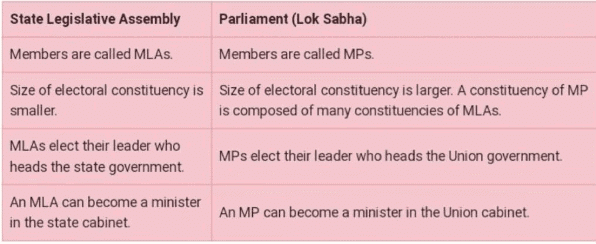Class 8 Civics Chapter 3 Important Question Answers - Why Do We Need Parliament
Q1. Why do you think our national movement supported the idea that all adults have a right to vote?
Ans: Under colonial rule, people lived in fear of the British government and disagreed with many of its decisions. The belief emerged that every responsible citizen should have a say in government, regardless of social background. This was essential for a truly democratic and representative nation where individuals from all walks of life could:
- Participate in decision-making
- Contribute to the country's progress
The freedom movement transformed this situation. Nationalists began to openly criticise the British government and made demands, such as:
- Having elected members in the legislature
- Rights to discuss the budget and ask questions
This is why the nationalist movement supported the idea of universal adult franchise, allowing all adults to participate in the country's decision-making process. The aspirations of the freedom struggle were realised in the Constitution of independent India, which established the principle that all adult citizens have the right to vote.
Q2. Use the terms ‘Constituency’ and ‘Represent’ to explain who an MLA is and how the person gets elected.
Ans: An MLA (Member of the Legislative Assembly) is a representative elected to serve in the state legislature.
- Constituency: A state is divided into various constituencies based on its population.
- Represent: Each constituency elects one representative, who becomes an MLA and advocates for the interests of the people in that area.
In summary, an MLA is elected by the voters in their constituency to represent their needs and concerns in the legislative assembly.
Q3. What is the difference between a State Legislative Assembly (Vidhan Sabha) and a Parliament (Lok Sabha)?
Ans: 
Q4. From the list below, identify the work of a State government and that of a Central government.
- The decision of the Indian Govt. to maintain peaceful relations with China.
- The decision of the Madhya Pradesh govt. to discontinue Board exams in Class VIII for all schools under this Board.
- Introduction of a new train connection between Ajmer & Mysore
- Introduction of a new 1,000 rupee note
Ans.
- The decision of the Indian Govt. to maintain peaceful relations with China. (Central Govt)
- The decision of the Madhya Pradesh govt. to discontinue Board exams in Class VIII for all schools under this Board. (State Govt)
- Introduction of a new train connection between Ajmer & Mysore (Central govt)
- Introduction of a new 1,000 rupee note (Central Govt)
Q5. Fill in the blanks
Democratic governments, in our times are usually referred to as representatives’ democracies. In representative democracies, people do not participate -----but, instead, choose their - - --- through an election process. These ---- meet & make decisions for the entire population. These days, a govt. can not call itself democratic unless it allows what is known as ------. This means that all adult citizens in the country are allowed to vote.
Ans.
Democratic governments, in our times are usually referred to as representatives’ democracies. In representative democracies, people do not participate directly but, instead, choose their representative through an election process. These MLA’s meet & make decisions for the entire population. These days, a govt. can not call itself democratic unless it allows what is known as Universal Adult Franchise. This means that all adult citizens in the country are allowed to vote.
Q6. Why do we have a system where the representatives are elected for a fixed period and not for life?
Ans: We have a system where representatives are elected for a fixed period rather than for life for several important reasons:
- Accountability: Elected representatives must remain accountable to their voters. A fixed term ensures they are regularly assessed by the public.
- Prevention of Abuse: Limiting the duration of service helps prevent representatives from becoming too powerful and misusing their authority.
- Democratic Principles: Lifetime appointments would undermine the essence of democracy, as it would restrict voters' ability to choose or change their leaders.
- Voter Influence: Fixed terms allow voters to express their desires for change through elections, ensuring their voices are heard.
Q7. Describe the ways other than participating in elections to express approval or disapproval of the actions of the government.
Ans: People can express their approval or disapproval of government actions in several ways beyond just voting in elections. Here are some common methods:
- Participating in political discussions to share views and opinions.
- Writing letters to elected representatives to voice concerns or support.
- Campaigning for candidates who align with their beliefs during elections.
- Expressing opinions on government laws through various media channels.
- Contesting elections to offer alternative viewpoints.
These actions help citizens engage with their government and influence decision-making.
|
69 videos|431 docs|46 tests
|
FAQs on Class 8 Civics Chapter 3 Important Question Answers - Why Do We Need Parliament
| 1. What is the role of Parliament in the law-making process? |  |
| 2. How does a bill become a law in Parliament? |  |
| 3. What are the different types of bills in Parliament? |  |
| 4. What is the significance of a debate in Parliament? |  |
| 5. What happens if the President refuses to give assent to a bill? |  |

















